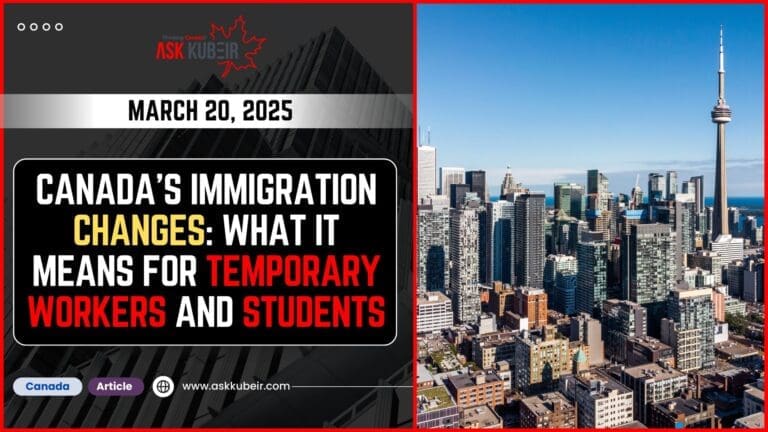
Canada Introduces Study Permit Exemption for Construction Apprentices
The Canadian government has announced a new study permit exemption for foreign workers in the construction trades. This means that some temporary foreign workers can now join apprenticeship programs without needing a separate study permit! Who Can Apply? To qualify for this study permit exemption, you must: This new rule took effect on February 26, 2025, and will be valid until February 26, 2027. Eligible Construction Occupations The following construction jobs qualify for this exemption: Occupation NOC Code Bricklayers 72320 Cabinetmakers 72311 Carpenters 72310 Civil engineering technologists and technicians 22300 Civil engineers 21300 Concrete finishers 73100 Construction estimators 22303 Construction managers 70010 Construction millwrights and industrial mechanics 72400 Electrical mechanics 72422 Electricians (except industrial and power system) 72200 Floor covering installers 73113 Heating, refrigeration and air conditioning mechanics 72402 Heavy-duty equipment mechanics 72401 Home building and renovation managers 70011 Industrial electricians 72201 Painters and decorators (except interior decorators) 73112 Plumbers 72300 Roofers and shinglers 73110 Sheet metal workers 72102 Water well drillers 72501 Welders and related machine operators 72106 Important: Your job offer must match one of these NOC codes. If your job title is different but your duties match at least 51% of the tasks listed under that NOC code, it can still qualify. How to Apply? If you meet the eligibility requirements, follow these steps: How Long is the Exemption Valid? Your authorization to study will be valid until whichever happens first: Why is Canada Doing This? Canada is facing a housing crisis and needs more construction workers. Normally, apprentices must work and study, which means they need both a work permit and a study permit. This new policy removes that extra step, making it easier for foreign workers to gain skills and contribute to Canada’s workforce. New Permanent Residence Pathway The government has also announced a new PR pathway for construction workers! 1. What is an apprenticeship program?An apprenticeship program is a mix of on-the-job training and classroom study that helps workers develop skills in a specific trade. 2. What if my job title is not on the list?You may still qualify if your job duties match at least 51% of those in an eligible NOC code. Check the official NOC website to compare. 3. Do I need a separate application for this exemption?No, you just need to mention “Apprenticeship 25-27” in your online request. 4. Will this exemption apply to other industries?No, it is currently only for construction trades. 5. When will the new PR pathway details be available?The government has not provided a specific date, but it has confirmed that it is working on the program. This is great news for construction workers looking to build their careers in Canada! If you qualify, take advantage of this fast-track opportunity to gain valuable skills and secure a future in Canada. Would you like a consultation to explore your Canadian work options? Contact Ask Kubeir today! 📌 If you believe your VISA application should be showcased in the most favorable light when submitting to immigration, feel free to book our services. 📌 To book an appointment with Kubeir – Licensed Canadian Immigration Consultant, click the “Book Appointment” 📲 You may also reach us at this number for all immigration-related services: Disclaimer: This is for informational purposes only and not legal advice. Always consult experts like us or the official IRCC website for up-to-date details.









